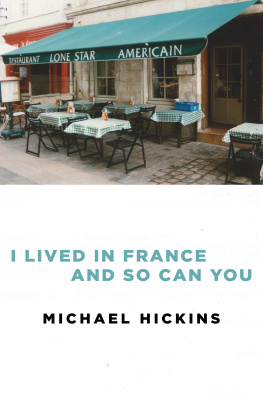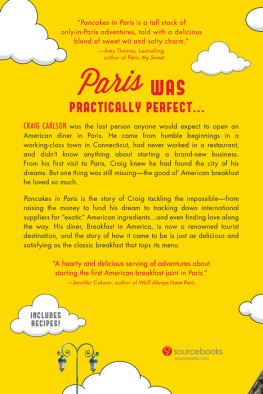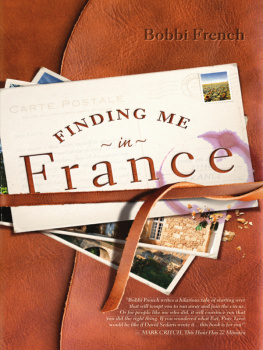I Lived in France
and
So Can You
Scandale at the Prefecture, and other effective strategies for getting your way in France.
By Michael Hickins
Dzanc Books
38609 Scott Dr.
Westland, MI 48186
www.dzancbooks.org
Copyright 2019 by Michael Hickins
All rights reserved, except for brief quotations in critical articles or reviews. No part of this book may be reproduced in any manner without prior written permission from the publisher.
Published 2019 by Dzanc Books
A Dzanc Books rEprint Series Selectionan eOriginal
eBooks ISBN-13: 978-1-954813-98-3
eBook Cover by Awarding Book Covers
Prologue
France holds a special place in the psyche of many Americans. Maybe its because we were taught about LaFayette and Rousseau and that we probably wouldnt be the same country today were it not for the French. Maybe its because of the American artists who came back from Paris with stories glorifying its arts scene and its savoir-vivre, or the GIs who were enchanted with pretty French girls.
Whatever the reason, France has a hold on the American imagination like no other country.
I was lucky enough to have lived there for 12 years as a young man in the 1980s and 90s, to have savored a lifetimes worth of experiences, including two marriages, the birth of two children, stints in the French movie industry, the Paris stock exchange, and a job at Euro Disney.
***
When I left my New York City home for France in 1985, I was jumping into the unknown, and against the advice of most everyone I knew. It didnt seem like a sound plan, but at the time I was convinced I was never coming home.
I had no shortage of friends, relatives, and even casual acquaintances telling me it was a foolish move. Unemployment in France was 10%, the Socialist Party electoral victory in 1981 four years earlier had made a country known for changing Republics more often than some of its men changed their shirts seem even more unstable than ever. It was Ronald Reagans Morning in America, which loosely translated meant something along the lines of stop wasting time with foolish dreams and get to work already.
My cousin Alain, the French son of my mothers late, beloved older brother George, complained in a letter to my sister Sue in 1989 that I was playing at being a writer in Paris. So when my first book, The Actual Adventures of Michael Missing, was published by Alfred A. Knopf in 1991 under the editorial leadership of the famously flamboyant editor Gordon Lish, I made sure Alain got a copy.
I was 24 and Ronald Reagan was in office when I married Anne Favalier and moved to Paris, and got my first job teaching English to businesspeople. I was 36 and Bill Clinton was President when I returned to New York from France, divorced from Anne, with my American wife Molly and our daughter Nora in tow. In between, I worked for Euro Disney, the French computer maker Honeywell Bull, Paris law firm Gide Loyrette Nouel, and Barclays French brokerage firm, BZW Puget Mahe. I worked in the French film industry, writing English-language dialogs for American characters in French movies for a number of French film directors, and then as a dialog coach to help French actors speak their lines. I hung around with painters and sculptors, wrote stories and novels none of which prepared me to work in a restaurant, other than all the life skills those experiences afforded me, and every single one of which I needed to succeed.
When I first moved to France with Anne, her friends would tease me for using slang from the 1930s, which was the slang my mother had grown up with and used in her childhood, while her exiled Russian parents insisted she speak only Russian at home. Oddly, my mother had been Russian, Mexican, and a naturalized American citizen, but never had French citizenship despite living her entire childhood in Paris.
Anne and I divorced after three years, and I met Charlotte, a computer graphic artist and computer scientist (during an era when few people had made the connection between computers and art) with blond hair she wore in a Bridget Bardot-style chignon.
Our son Catfish was born in 1990, eight months after Paris celebrated the 200-year anniversary of the French Revolution. Charlotte and I separated in 1992, but with an infant son in my life, I wasnt about to return home.
With the publication of The Actual Adventures of Michael Missing in 1991, my agent organized a number of readings that led to a meeting with another writer, Diane Desanders, who introduced me to her daughter. That was Molly, and Mollys Lone Star and then our daughter Nora was born of that.
The purpose of this book isnt to tell a straightforward story about one small restaurant in one small town in one small corner of France. Its about the blend of pleasure, history, politics, and entrepreneurialism that makes France such a unique place to live and run a business.
People are amazed to hear that I ran a business in France. And they should be. I knew as much about running a restaurant as I did about racing cars for a living.
But people shouldnt be amazed that you can run a successful business in France its a great place, as long as you understand the rules, which ones youre allowed to break, and how youre supposed to break them.
When I left for France, no one expected me to succeed, and when I returned, I had little to show, other than enough money to settle back into life in America. But of course, I had succeeded in many ways, and in ways that have been and will always remain important to me.
Most of all, I succeeded in proving, at least to myself, that following your dream is the most realistic thing you can do.
There will never be a shortage of well-meaning people who try to convince you that your dream, particularly if its not rooted in a firm business plan, is risky and potentially ruinous. This book is living proof that following your dreams is actually the most realistic approach to life.
So if youre one of those people who dreamed of buying a cottage or a farm in the French countryside, of renting an apartment in Paris or, you know, opening an American restaurant in an obscure little hamlet -- you should bust a move.
Chronology
1985: married Anne Favalier and moved to Paris
1986: started managing the Baseball Club de France
1988: met the artist Charlotte Tomei
1990: became father to Catfish Tomei
1991: Published The Actual Adventures of Michael Missing with Alfred A. Knopf
1992: Met Molly Elliott
1993: Launched Mollys Lone Star
1995: became father to Nora Hickins
1997: sold Mollys Lone Star
2013: married Carol Edwards
2016: became father to Maximilian Hickins
Acknowledgements
First and foremost I need to thank Carol Edwards Hickins, who lived with and encouraged the creation of this book from the very beginning. And of course Molly Elliott, my friend, ex-wife, originator of Mollys Lone Star, and mother to Nora Hickins.
No listing would be complete, because this book is about France, but thanks to Karl and Laurent (despite our differences) and Stephanie and Magali and Martina and Jeff and Cecile and David (Bidi) and Cyril and Patrice and Patrick and Serge and hundreds of other friends from La Rochelle who were part of the story of Mollys Lone Star.
And thanks also to Claude and Jennifer and Olivier and Jacques (a best mans best man) and Antoine and Michael Hoover.
And to my children Catfish and Nora, without whom there would be no story, and to my youngest son Max, for whom this story is worth telling.
And finally to Todd Gordon, whose friendship and first read have always been precious.
Chapter 1 Le Mollys (Mollys Lone Star)
The restaurant had been open one day when the cops barged in.
Next page







